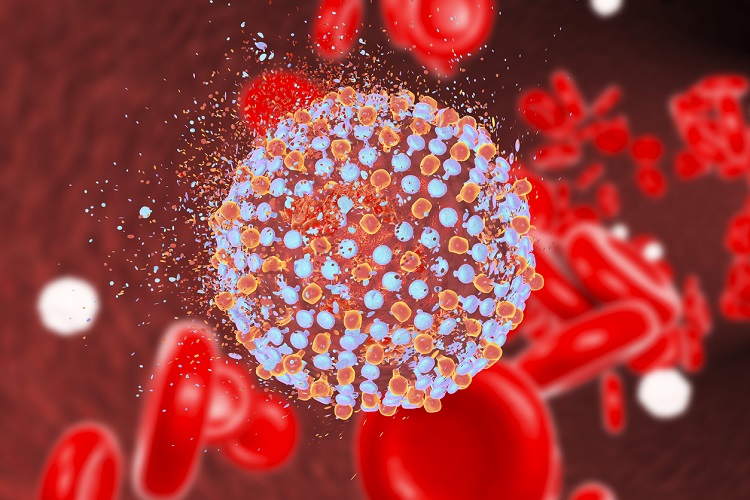10 April 2019
Stepping up efforts to prevent transmission of hepatitis C among people who inject drugs could reduce future infections by 43 per cent globally, according to a study by researchers at the University of Bristol published in the Lancet Gastroenterology and Hepatology.

Hepatitis C is a virus that is passed on through blood exposure and results in liver disease. It is estimated that over 70 million people are infected with the hepatitis C virus worldwide and that around 400,00 people with hepatitis C die each year due to related conditions such as cirrhosis of the liver and liver cancer.
People who inject drugs are at high risk of becoming infected with the virus through the sharing of needles, syringes and other injecting drug equipment. While the percentage of people with hepatitis C is estimated to be less than one per cent in most countries, the percentage of people who inject drugs with hepatitis C tends to be over 30 per cent.
The researchers used mathematical modelling to estimate how much the sharing of equipment for injecting drug use contributes to the hepatitis C epidemics for 88 countries, which account for 85 per cent of the world’s population.
They estimated that, if hepatitis C transmission due to the risk associated with injecting drug use was removed, around 43 per cent of all infections up to 2030 would be prevented globally.
Seventy-nine per cent of hepatitis C infections could be prevented in high-income countries and 38 per cent of infections in low- and middle-income countries. These estimates range from two per cent in Nigeria to 100 per cent in several countries, including Iceland and Finland, with estimates of 98 per cent for the UK and 77 per cent for the USA – rising to 85 per cent when assuming an increasing epidemic of injecting.
Before blood screening was introduced in the early 1990s, contaminated blood transfusions were thought to be the main route of hepatitis C transmission. However, this is no longer the case in many countries, particularly high-income settings such as the UK and the USA. Hepatitis C is also transmitted through the re-use of unsterilised medical equipment, which is much more common in many low- and middle-income countries.
In the last decade new direct acting antiviral treatments for hepatitis C have become available, which cure nearly all individuals with hepatitis C infections. Subsequently, the World Health Organization has set targets to eliminate hepatitis as a public health problem by 2030.
Adam Trickey, from the NIHR Health Protection Research Unit in Evaluation of Interventions at the University of Bristol and lead author of the study, said: “As blood screening has improved, and there is less use of unsterilised medical equipment, a higher proportion of hepatitis C infections occur among people who inject drugs through the sharing of drug injecting equipment. This research highlights the importance of combating the hepatitis C epidemic among people who inject drugs, especially for meeting the World Health Organization’s 2030 elimination targets.”
Professor Peter Vickerman, from the NIHR Health Protection Research Unit in Evaluation of Interventions at the University of Bristol, who co-led the study, said: “Interventions already exist to reduce the transmission of hepatitis C among people who inject drugs, including methadone maintenance treatment, the provision of clean needles and syringes, and treating hepatitis C infections with direct acting antivirals. However, in most countries, these interventions are not widely used. Without significantly reducing hepatitis C virus transmission among people who inject drugs the World Health Organization’s elimination targets cannot be met.”
Paper:
The contribution of injecting drug use as a risk factor for hepatitis C virus transmission globally, regionally, and at country level: a modelling study by Adam Trickey et al. in Lancet Gastroenterology and Hepatology
Further information
About the NIHR Health Protection Research Unit in Evaluation of Interventions
The Health Protection Research Unit (HPRU) in Evaluation of Interventions, based in Population Health Sciences at the University of Bristol, is part of the National Institute for Health Research (NIHR) and a partnership between University of Bristol and Public Health England (PHE), in collaboration with University College London, Cambridge Medical Research Council (MRC) Biostatistics Unit and University of the West of England. We are a multidisciplinary team undertaking applied research on the development and evaluation of interventions to protect the public’s health. Our aim is to support PHE in delivering its objectives and functions. Our focus is on the PHE priority area of infection. Follow us on Twitter: @HPRU_EI
About the National Institute for Health Research
The National Institute for Health Research (NIHR) is the nation’s largest funder of health and care research. The NIHR:
- funds, supports and delivers high quality research that benefits the NHS, public health and social care
- engages and involves patients, carers and the public in order to improve the reach, quality and impact of research
- attracts, trains and supports the best researchers to tackle the complex health and care challenges of the future
- invests in world-class infrastructure and a skilled delivery workforce to translate discoveries into improved treatments and services
- partners with other public funders, charities and industry to maximise the value of research to patients and the economy.
The NIHR was established in 2006 to improve the health and wealth of the nation through research and is funded by the Department of Health and Social Care. In addition to its national role, the NIHR commissions applied health research to benefit the poorest people in low- and middle-income countries, using Official Development Assistance funding.